Free Strategies for SEO and Content Excellence: Boost Your Game’s Success in 2024

Written by Brand Pixie Mini, 27 August 2024
[Introduction]
Who Needs SEO and Why?
ASO and SEO: Similar Yet Different
There’s an overwhelming amount of information floating around on the internet. In fact, it’s common practice to search for answers to our questions online.
Your potential game players are no different.
SEO
SEO stands for Search Engine Optimization.
Users search for games they might enjoy playing by exploring various web pages through search engines. But how likely are they to stumble upon your game amidst the sea of content online?
To increase those odds, you need to optimize your game’s information so that it ranks higher in search results—that’s what SEO is all about. Imagine you’ve launched a pixel-style idle RPG game. If your game-related page appears at the top when someone searches for "pixel idle RPG," it would be a huge marketing win.
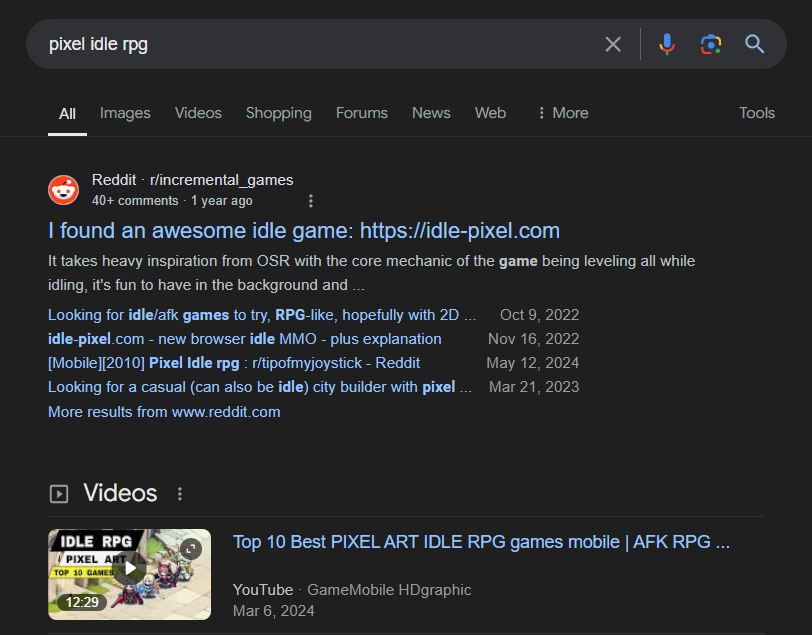
ASO
Actually, developers are already using a similar strategy when releasing games!
That’s ASO, which stands for App Store Optimization. Like SEO, ASO aims to have your game appear at the top of search results in app stores.
When you register your game in the store, every action you take—writing the title and description, uploading images and videos—is part of ASO.

Why SEO is a Must Alongside ASO
There are two main ways users find your game: through the store and external searches.
Most users discover games via app stores like the App Store or Google Play, which is why many developers naturally focus on ASO. However, the importance of optimizing for users who come from outside the store, i.e., SEO, is often overlooked, even though SEO is a highly effective marketing strategy that requires little cost.
Game developers should use both ASO and SEO. Users search for game information on the web as well as in stores, so it’s crucial to enhance your game’s visibility through SEO on game-related websites, blogs, and communities.
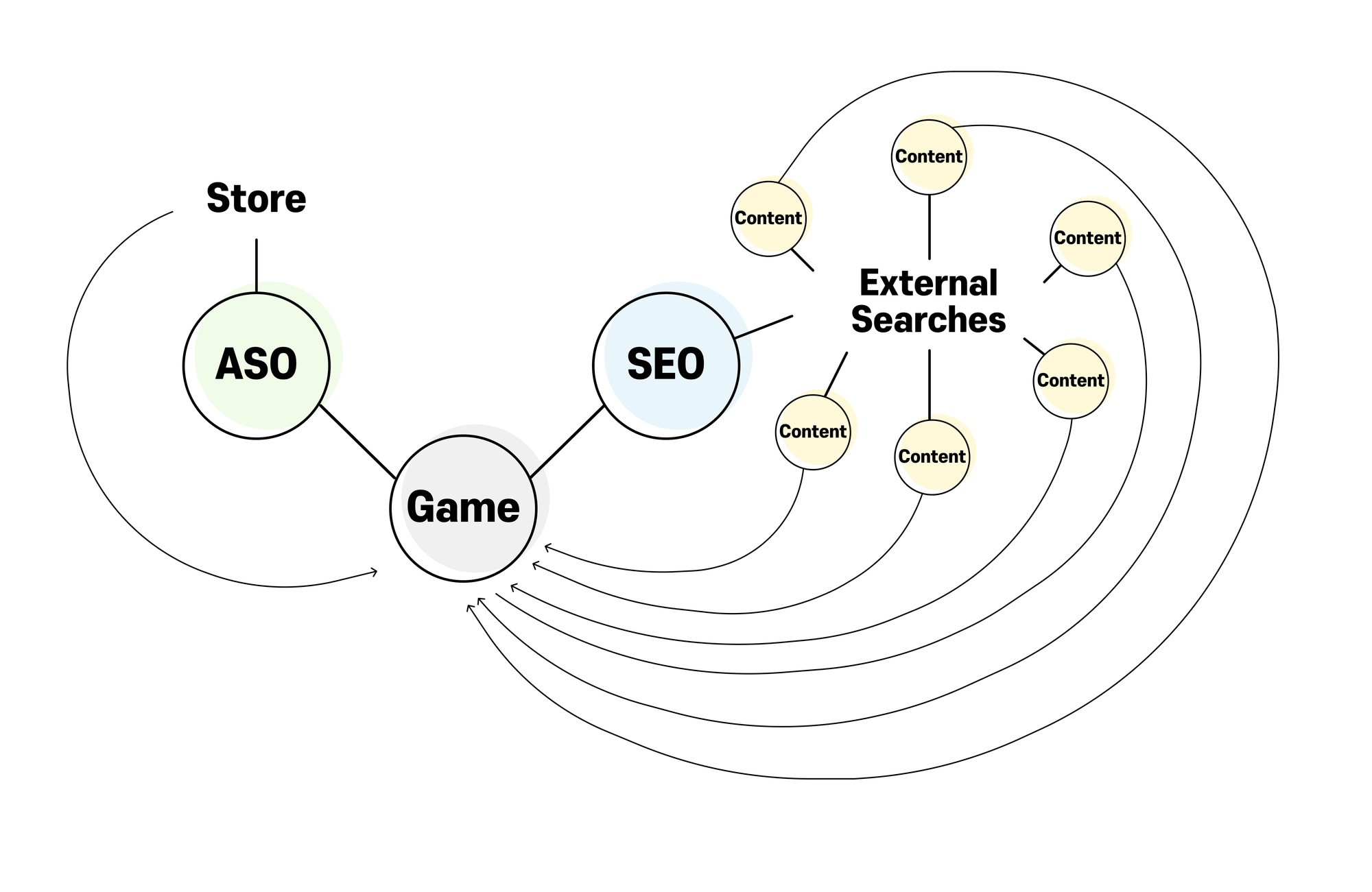
Think about it—searching is the action that most clearly reveals a user’s intent. This in itself serves as targeting, allowing you to effectively reach users without spending heavily on ads. Users search for specific keywords and click on the most appealing sites that appear in the results.
So, our goal is to ensure that your game’s content ranks high when users search for relevant terms.
In other words, to market your game more effectively, you need to focus on two key tasks:
Find the ‘right keywords’ related to your game.Create ‘compelling content’ that aligns with those keywords.
Today, we’ll dive into these two topics, starting with the basics of SEO—‘keywords’ and ‘content.’
[Body]
1. How to Find the ‘Right Keywords’ for Your Game
Three Criteria for a Good Keyword
What makes a keyword good for SEO? It’s a core keyword that effectively represents the key features of your game while also being a term your target audience frequently searches for.
To ensure that searches lead to clicks, and clicks lead to downloads, the user’s search intent and your content should be aligned. A good keyword forms that connection, and the ‘right keyword’ should meet these three criteria:
(1) It fully captures the target user’s search intent.
Search intent refers to the reason behind the user’s search for that keyword.
The more specific the search intent, the more valuable it is. For example, "pixel idle RPG" reflects the user’s intent better than just "idle RPG," and "side-scrolling pixel idle RPG" does so even more. While specific keywords might have lower search volumes, they offer the advantage of reaching your target audience more directly.
Users who discover your game through such keywords might feel like they’ve found exactly what they were looking for!
(2) It generates sufficient search volume every month.
Search volume indicates how often a keyword is searched.
High-volume keywords can drive more traffic, but as mentioned earlier, they tend to be more general and may lack precision in reflecting search intent.
When selecting keywords, it’s important to set a benchmark for adequate search volume and choose keywords that also align with search intent.
(3) A considerable amount of content (Actually Many!) already exists for that keyword.
A valuable keyword will already have a lot of content associated with it. This popularity is measured as ‘competition.’
High-competition keywords are valuable, but they’re also harder to higher rank for. That’s why it can sometimes be strategic to choose keywords with lower competition, even if they have lower search volumes.
Three Ways to Find Good Keywords
To find keywords that meet the criteria of a ‘right keyword,’ you need specific methods. Here are three effective ways to find such keywords:
(1) Collecting Google Autocomplete Keywords
Google suggests up to 10 related keywords based on what users type in the search box.
For example, if you search for "online game," you might see suggestions like "online game ranking," "online games to play with friends," or "online games for PC." You can select the keywords that best match your game and search again to discover even more specific and useful keywords.
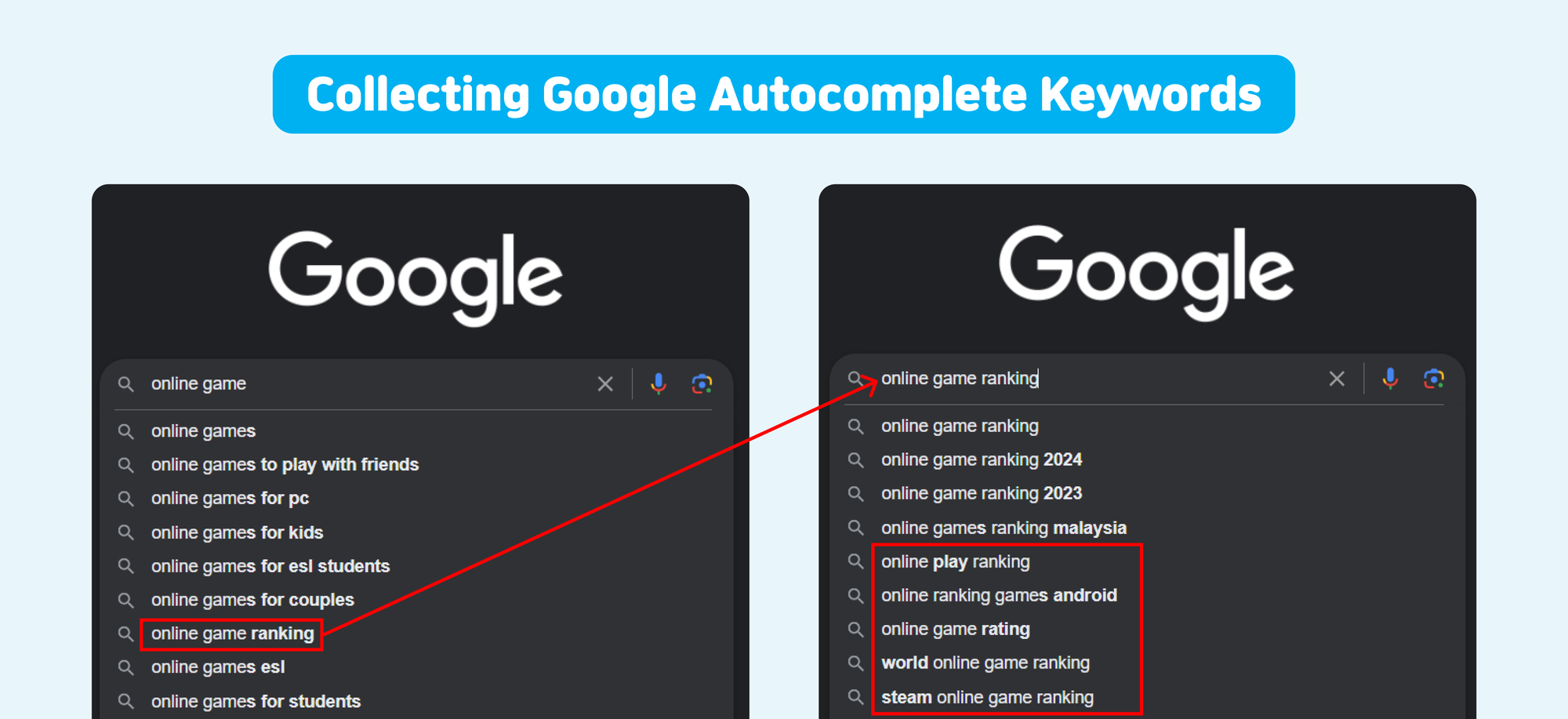
(2) Using Keyword Planner
Keyword Planner is a tool provided by Google that lets you check monthly search volume, related keywords, competition, and more.
For instance, if you enter the keyword "online game," Keyword Planner might show a monthly search volume of 100K to 1M and a competition level of Low. You can use this tool to confirm the search volume and competition for various keywords and make informed decisions.
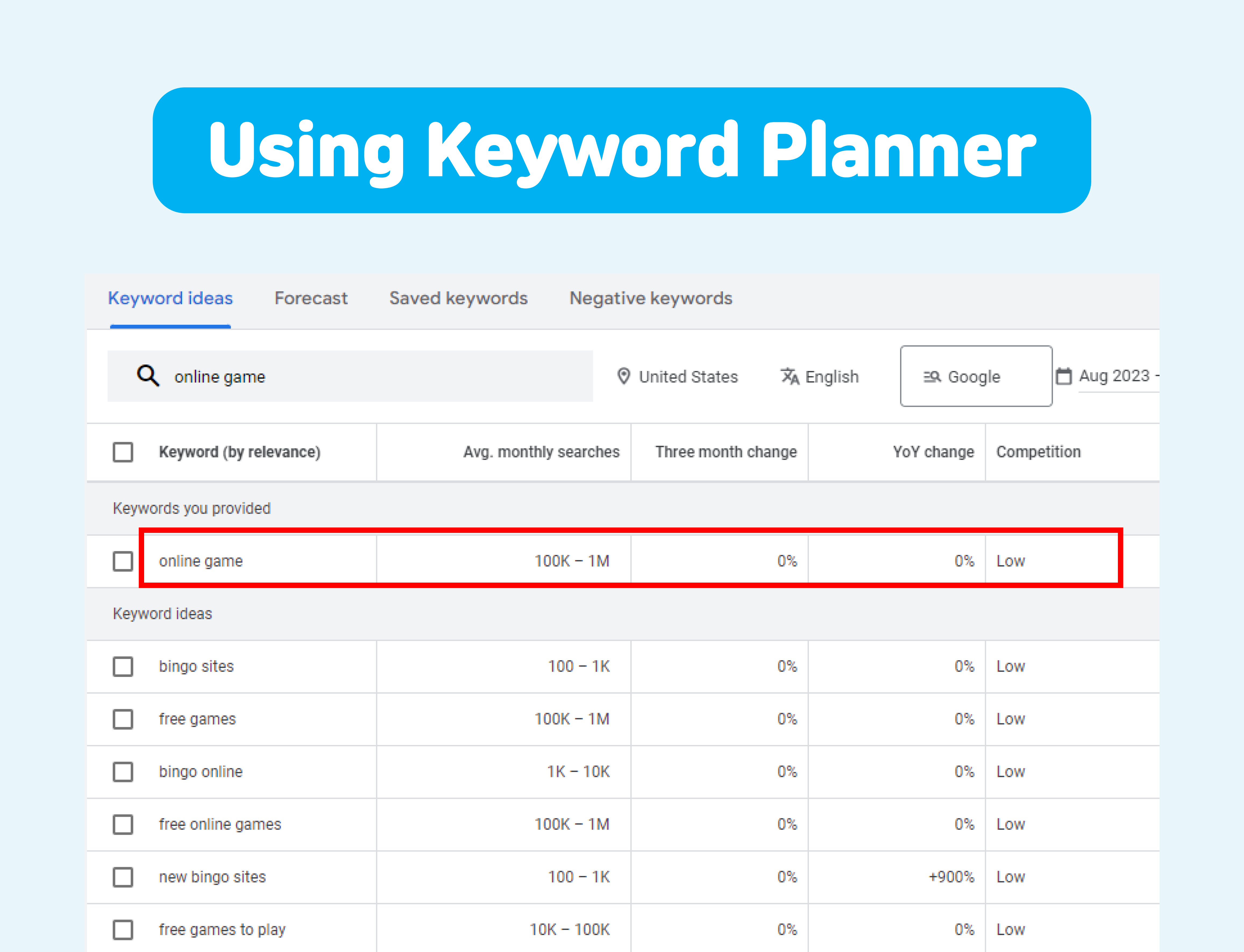
(3) Checking Google Trends
Some keywords gain attention over time, while others fade away. Google Trends allows you to see how interest in a specific keyword has evolved over time.
For example, if you check the trend for "idle RPG," you might find that interest has been steadily increasing over time. This suggests that the keyword may continue to have strong search volume in the future.
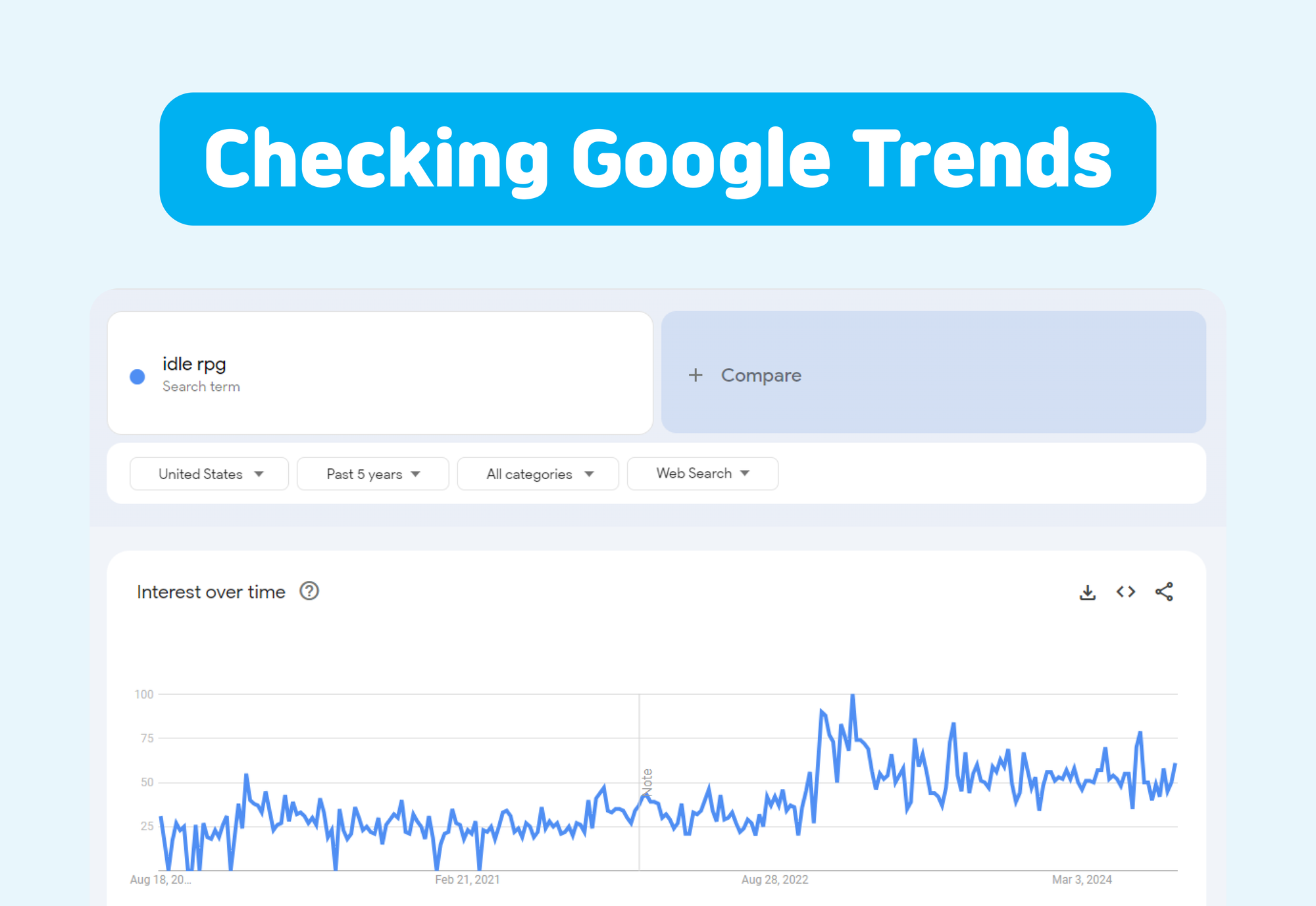
2. How to Create Compelling Content Around Your Keywords
Once You’ve Selected Your Keywords, Make the Most of Them
Finding good keywords is just the beginning. Creating effective content around those keywords is key.
However, it might not be feasible for developers to create all the content themselves. In this case, you can efficiently produce content by seeking external help.
As a developer, you can set the content strategy based on the keywords, while specific tasks like content creation can be handled by content experts or through user communities. Here are a few content creation methods you can try
Content Creation Methods that You Can Try
(1) Publishing Game Development story on Your Blog
A game development story is a unique form of content that only a developer can create.
Since it’s written by the developer themselves, there's a significant advantage in being able to freely produce content centered around the desired keywords. However, balancing the tasks of developing and managing a game while also maintaining writing is no easy feat.
To help with this challenge, here are two alternative methods you can try, which could be described as ‘effortless solutions.’
(2) Running a User-Engaged Online Community
An online community that encourages user participation is a treasure trove that automatically generates content containing keywords related to your game daily.
The more users who participate and frequently post, the more content will appear in search results. When the community is active, it’s like employing thousands or even tens of thousands of staff members to voluntarily produce content every day.
To encourage community participation, you might want to add a ‘Go to Online Community’ button in the game or host a ‘Post Creation Event.’ Especially, events encouraging posts with specific keywords can help gain an advantage in keyword searches.

(3) Collaborating with KOL
Game reviews by KOL especially in the YouTube are a powerful wildcard that can be played after your game’s launch.
If you’re lucky, an KOL might review your game voluntarily, bringing in tens of thousands of new users in a short period. Moreover, the video will continue to exert influence as a piece of content on the YouTube platform for a long time.
If the ‘User-Engaged Online Community’ mentioned earlier is active, KOL may see your game as worth reviewing. After all, reviewing games with a dedicated fanbase is beneficial for KOL too.
Look for YouTube reviewers who match your game’s vibe and propose a collaboration.
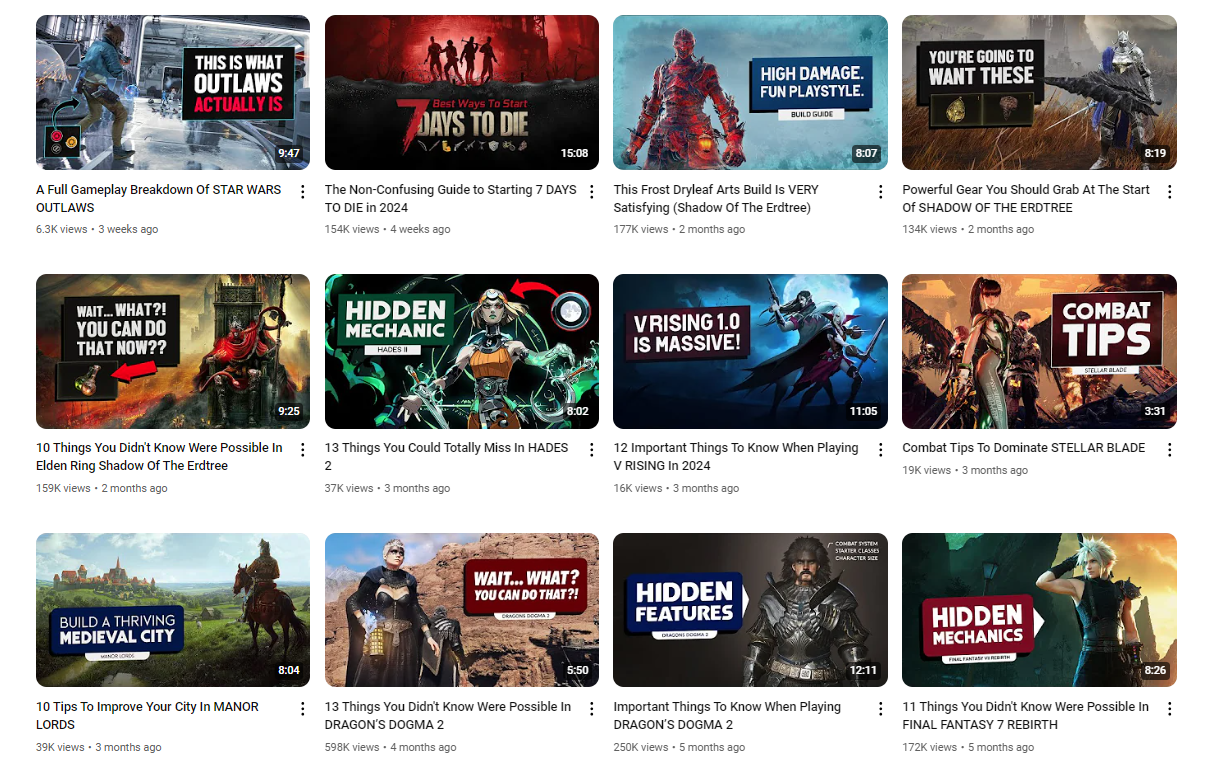
[Conclusion]
SEO is all about from Keywords to Content
We’ve covered a lot of ground today, but the conclusion is simple: Find the right ‘good keywords’ related to your game and produce ‘compelling content’ based on them!
Instead of creating content yourself, I recommend rely on your fans and KOL to do it. This way, you can dedicate more time to core game development and liveops. You might be make the result in more precise keyword targeting, but they can do better in lead to explosive traffic growth than you.
Set up an online community space where users can voluntarily post, and find KOL who can review your game on YouTube. The more diverse content you accumulate, the more pathways you create for users to access your game.
If you like this posting, please subscribe us!

© 2024 AFI, INC. All Rights Reserved. All Pictures cannot be copied without permission.

![[External Essay] Gamescom 2025 Interactions](/content/images/size/w600/2025/09/------1.png)


